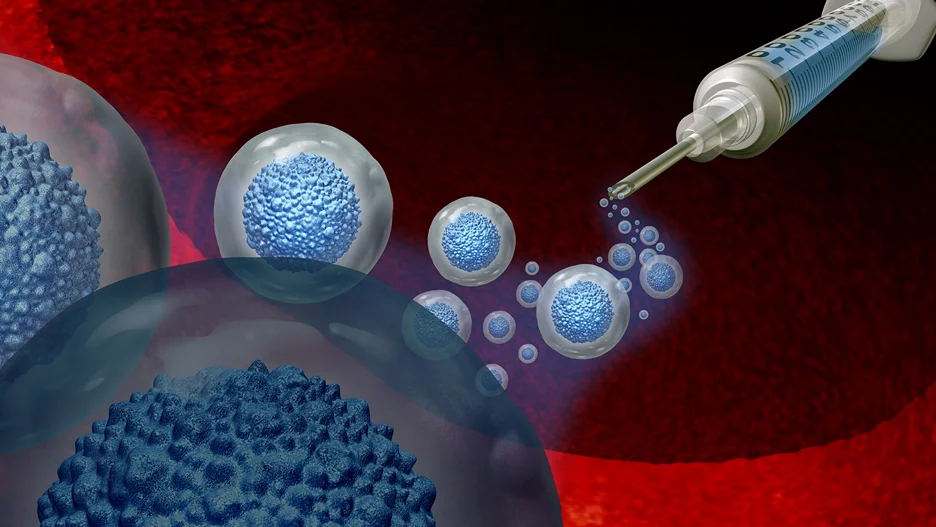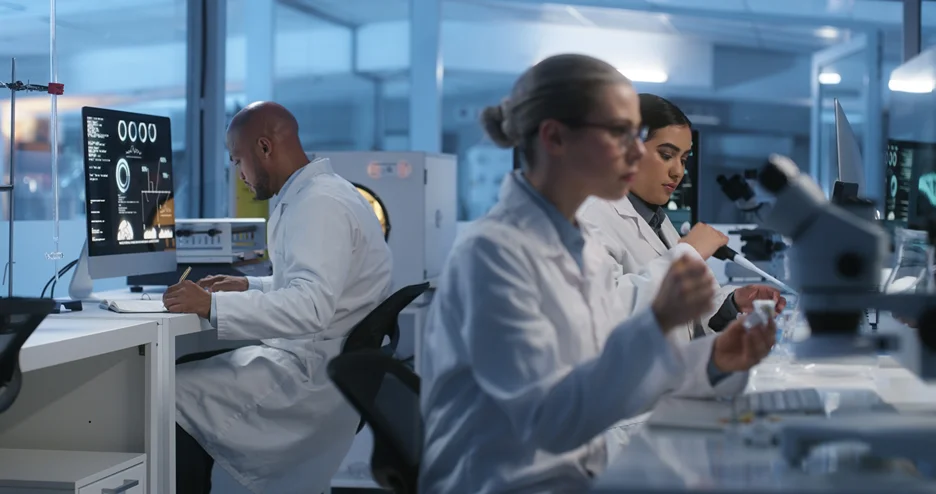Shaping Tomorrow’s Healthcare: The Potential of Exosome Therapy
Exosome injections are rapidly gaining attention as a breakthrough technology in regenerative medicine, poised to revolutionize the treatment of injuries, diseases, and even the aging process.
But what exactly are these exosomes, and how can their unique properties, when delivered through injections, be harnessed for innovative therapeutic applications?
What Are Exosomes?

Exosomes are small lipid vesicles, essentially tiny bubbles, released by cells. They function as messengers, carrying molecules like proteins, lipids, and genetic material.
These components are derived from the cells that produce the exosomes, allowing them to transfer information to other cells, akin to sending a package with specific contents.
Understanding how these vesicles are produced is key to appreciating their role in cellular communication.
How Are Exosomes Produced?
Within a cell, when it’s time to release exosomes, these vesicles bud off from the cell membrane. This process captures a sample of the cell’s contents, which is crucial for the exosome’s role in cell-to-cell communication.
The source of exosomes can significantly influence their properties and potential applications, especially when derived from stem cells.
What Makes Stem Cell-Derived Exosomes Special?
Researchers show particular interest in exosomes from stem cells, like mesenchymal stem cells (MSCs) and adipose-derived stem cells (ADSCs).
These exosomes are valuable because they carry the regenerative and anti-inflammatory properties of their parent stem cells, making them promising for therapeutic uses.
Before these potent exosomes can be utilized therapeutically, they must first be isolated from cell cultures through a meticulous process.
How Are Exosomes Isolated for Research and Therapy?
To use exosomes for research or therapy, they must be isolated from cell cultures. This process involves multiple steps, including centrifugation and filtration.
These steps help separate exosomes from other cell culture by-products. Once isolated and purified, these exosomes can be analyzed or modified for clinical applications.
One of the most promising applications of these isolated exosomes is their use in therapeutic injections.
What Are Exosome Injections?

Exosome injections involve introducing exosomes, tiny cell-derived vesicles, into the body for therapeutic purposes. These exosomes are filled with various molecules such as proteins and RNA, reflecting the nature of the cells they come from.
The effectiveness of these injections hinges on the unique way exosomes communicate with recipient cells.
How Do Exosomes Communicate With Cells?
Exosomes, when injected or introduced to tissues, merge with the target cells.
Through this fusion, they transfer their contents into these cells, potentially altering their behavior and physiology. This unique ability to reprogram cells underscores their therapeutic significance.
The cargo these exosomes carry is varied and plays a crucial role in their therapeutic potential.
What Types of Cargo Are Carried by Exosomes?
A key component of exosomes is their nucleic acid content. They carry genetic materials like mRNA, microRNA, and various non-coding RNAs.
By transferring these molecules to recipient cells, exosomes can influence protein synthesis and gene expression, impacting the cells’ functions.
Beyond genetic material, exosomes also exert influence through the transport of proteins and lipids.
How Do Exosomes Influence Cell Signaling?
Exosomes are not just carriers of genetic material. They also transport numerous proteins that can modify cell signaling pathways.
The surface proteins of exosomes play a crucial role in this process, ensuring selective targeting and uptake by specific tissues and cells post-administration.
In addition to proteins and RNA, the lipid content of exosomes plays a vital role in their function.
What Role Do Exosome Lipids Play?
The lipid membrane of exosomes is not just a structural component; it serves as a carrier for bioactive lipids.
These lipids, once delivered to recipient cells, can have various effects, such as modulating inflammation, immune responses, and insulin sensitivity, demonstrating the diverse therapeutic potential of exosomes.
This multifaceted communication and cargo delivery system is what makes exosome therapy an intriguing field of study.
Curious about exosome injections? Get in touch with FACE Med Store to explore this innovative therapy.
How Does Exosome Therapy Work?
The process of exosome therapy includes extracting exosomes from donor stem cells or other cell types. These exosomes are then injected into patients. The key idea is that the exosomes will deliver their cargo to the recipient cells in the patient’s body, potentially inducing regenerative effects.
How Are Exosomes Being Used for Therapeutic Benefits?

Harnessing exosomes for clinical applications involves leveraging their innate regenerative, anti-inflammatory, and signaling properties. Some of the most promising therapeutic areas include:
Tissue Regeneration
Exosomes derived from MSCs accelerate tissue and organ repair through several mechanisms. The mRNAs and proteins transferred by exosomes can stimulate cell proliferation, modulate the immune system, and increase blood vessel growth (angiogenesis).
In preclinical studies, MSC exosome treatment enhanced recovery in models of lung, heart, and brain injuries. These regenerative effects could eventually be used to improve wound healing and tissue engineering.
Exosomes in Aesthetic Medicine
Dermatologists use exosome injections for skin rejuvenation, stimulating collagen synthesis, and promoting angiogenesis. In some treatments, exosomes replace or complement Platelet-Rich Plasma (PRP), offering a broader range of growth factors.
Immune Modulation
The anti-inflammatory effects of exosomes are powerful and multi-faceted. Proteins and RNAs carried in exosomes can directly regulate immune cells like macrophages.
Exosomes from MSCs also display proteins on their surface that dampen excessive immune responses.
This makes exosome therapy promising for treating autoimmune and inflammatory disorders like rheumatoid arthritis, inflammatory bowel disease, and graft-versus-host disease.
Neuroprotection
MSC exosomes promote neurogenesis and can protect neurons from apoptosis and oxidative stress. Certain microRNAs in exosomes also enhance nerve regeneration after injury.
Early research indicates exosome treatment may help recover functional neurons and prevent deterioration in conditions such as stroke, traumatic brain injury, and neurodegenerative diseases.
Cancer Therapy
In addition to regenerative properties, exosomes derived from normal cells show anti-cancer abilities.
They suppress tumor growth angiogenesis, activate immune cells to target cancer, and sensitize tumors to chemotherapy or radiation.
Some studies load exosomes with anti-cancer drugs for targeted drug delivery to malignant tissue while avoiding systemic toxicity. Either approach could bolster the arsenal of cancer treatments.
What Are the Regulatory Considerations for Exosome Therapies?
Given their complex biological nature, exosome-based treatments do not fit neatly into existing regulatory frameworks like drugs or cell therapies. However, various regulatory agencies are developing new guidelines for exosomes used therapeutically.
In the United States, the FDA considers exosomes as biological products and drugs, subject to stringent regulations. Manufacturing, preclinical requirements, and clinical trials for exosomes share similarities with other advanced therapeutics like gene and cell therapies.
The FDA has yet to approve any exosome product, but unique regulatory pathways like Regenerative Medicine Advanced Therapy (RMAT) and Breakthrough Therapy designations may accelerate approval for particularly innovative exosome therapies.
Internationally, exosome regulations are still evolving. Dialogue between global regulatory bodies will be important for developing consistent and effective standards for this exciting new modality.
What Are the Ethical Issues Around Exosome Therapies?
While the potential of exosomes generates excitement, there are ethical issues to consider as well:
- Sourcing: Exosomes derived from adult stem cells avoid the ethical concerns associated with embryonic stem cells. However, if exosomes eventually are manufactured from induced pluripotent stem cells, it could raise sourcing concerns.
- Accessibility: Due to their complex manufacturing, exosome therapies could be costly initially. More affordable access will be an issue once proven effective.
- Safety: Ethical standards require rigorous preclinical and clinical testing to avoid exploiting vulnerable patients with unproven treatments.
- Commercialization: As with any new technology, there is the potential for certain exosome applications to be over-hyped if commercialized prematurely based on limited data. This could undermine public trust.
With thoughtful evidence-based implementation and policies that enable access, exosome technology can be harnessed ethically to make a profound impact on human health.
Exosome Injections: Charting a New Era in Regenerative Medicine

Exosome injections are at the forefront of a breakthrough that could radically transform regenerative medicine.
These injections harness the ability of exosomes to reprogram cellular functions, presenting vast potential in treating diseases, injuries, and combating the aging process.
Yet, significant challenges remain. Demonstrating clinical safety and efficacy, establishing manufacturing and regulatory standards, and ensuring global accessibility and affordability of these therapies are critical steps ahead.
Only through rigorous scientific research and open communication among researchers, regulators, ethicists, and policymakers can exosome technology truly benefit humanity to its fullest therapeutic potential.
If these conditions are met, humanity may view exosomes as a pivotal moment in medical history.






